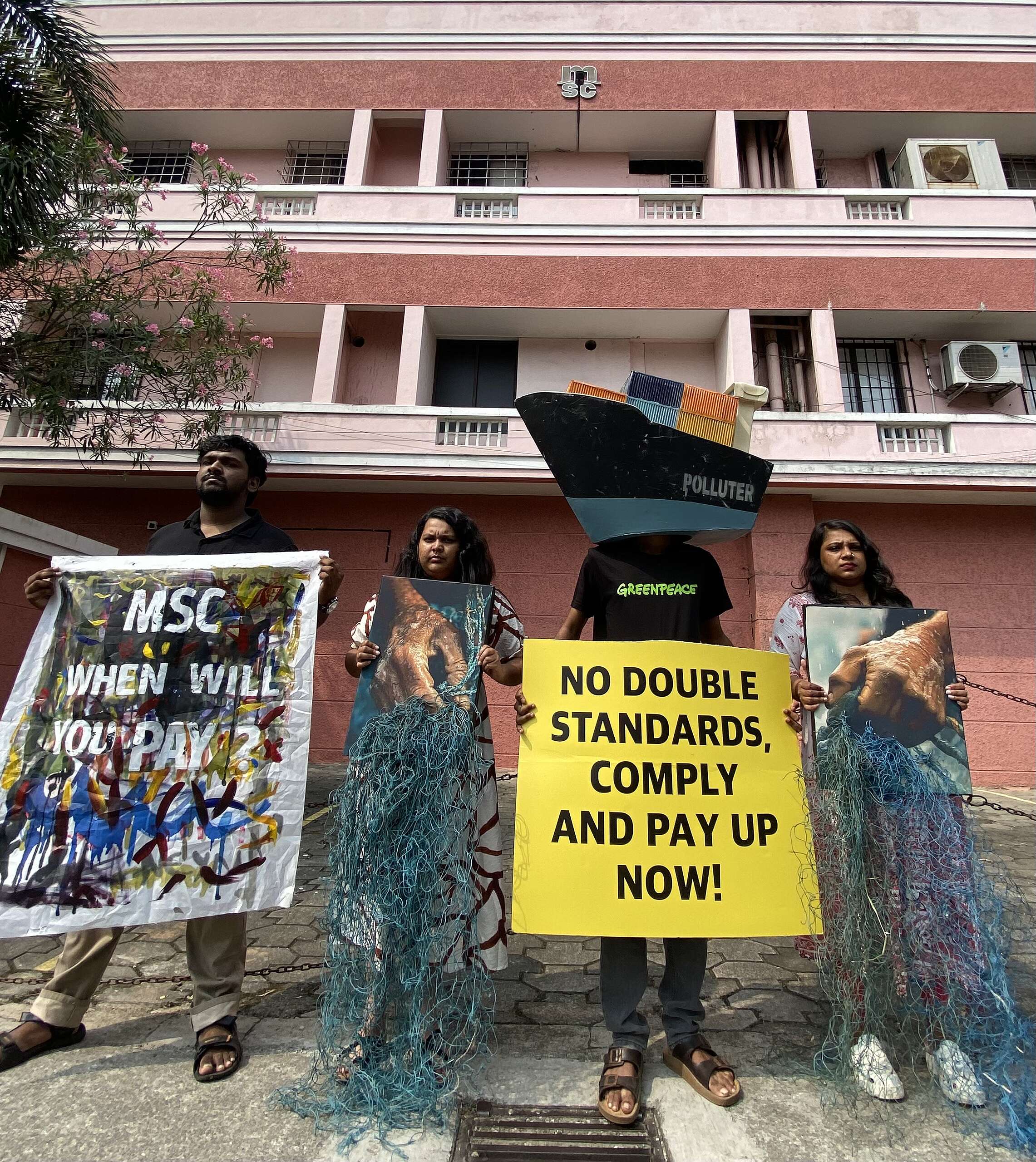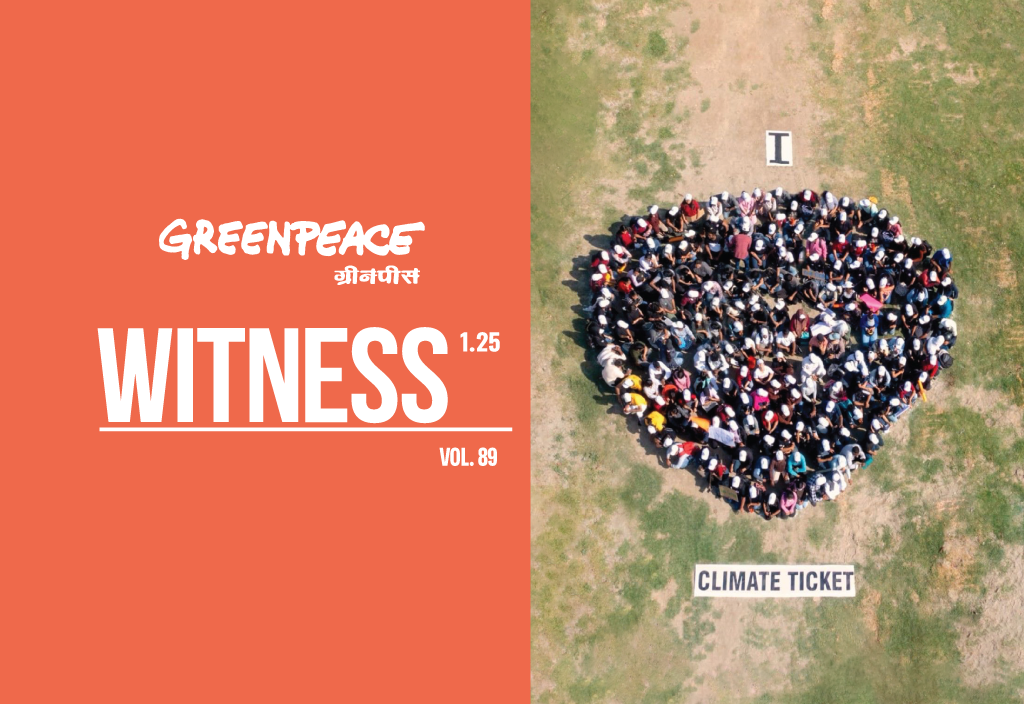Coastal communities in Odisha’s Ganjam district join Greenpeace in a powerful call ahead of COP30, spotlighting trillions in climate damages caused by major oil and gas corporations.
Podampeta, Odisha, 2 November, 2025 — In a striking call for climate justice ahead of COP30, community members, women and Greenpeace activists came together in Podampeta village today to unveil a giant climate bill demanding that the world’s biggest fossil fuel corporations to be held accountable for the escalating costs of the climate crisis.
The centerpiece of the event was a large-scale installation of the giant printed bill depicting the message for global leaders — “Make Climate Polluters Pay”. The bill presents a selection of extreme weather events in South Asian countries since the Paris Agreement was adopted in 2015, symbolizing the mounting losses communities are enduring due to climate change.
The bill reveals that economic damages from carbon dioxide (CO₂) emissions of five major oil and gas corporations since the Paris Climate Agreement (2016-2025) are projected to amount to over US$ 5.36 trillion, according to leading experts on the social cost of carbon (SCC). This is nearly 7000 times greater than the amount countries have currently pledged to the UN’s fund for loss and damage, set up to support communities in Global South countries facing the impacts of climate change.[2][3]
Set against the coastal backdrop of Ganjam, one of India’s most climate-vulnerable regions, this symbolic action sent a clear message to the UNFCCC and world leaders gathering for COP30: climate justice is not charity, it is accountability. Local communities’ participation underscored the human cost of fossil fuel-driven climate change and the urgent need for fair climate finance, adaptation support, and reparations for loss and damage.
“We have lost our homes, and our income to the cyclones that keep coming harder each year. The sea is rising, taking away our future and we are paying the price for a crisis we didn’t create. It’s time the big polluters pay for the damage they’ve caused,” said Chandragiri Tiki, community member from Podampeta village.
Selomi Garnaik, Climate and Energy Campaigner at Greenpeace India, speaking at the installation, said, “Over the past decade, India has witnessed repeated extreme weather events like heatwaves, cyclones, floods and rising seas, that have grown in both intensity and frequency. Through attribution science, reports, experts and scientists have linked these devastation directly to the burning of fossil fuels. Communities like those in coastal Odisha are on the frontlines, losing homes, livelihoods, and health to a crisis they did not create. This giant bill represents the unpaid debt owed to communities who did not cause this crisis but are paying for it every day. As world leaders head to COP30, our message is simple that justice means making polluters pay and using those funds to protect people and the planet.”
Emissions from a handful of investor-owned oil companies are driving the climate crisis, making wildfires, floods, typhoons, heatwaves and droughts more frequent and severe. As the world looks to COP30 for decisive action, the voices from Podampeta echo a universal demand of “make climate polluters pay”.
Check out the bill here:
Media Contacts:
Nibedita Saha, Media Officer, Greenpeace India
[email protected]
Selomi Garnaik, Climate and Energy Campaigner, Greenpeace India
[email protected]
Notes:
Heatwave 2024- Data link: https://www.greenpeace.org/static/planet4-international-stateless/2024/11/e4de275e-paying-the-price.pdf
[2] The quantification of economic damages since 2015 was provided to Greenpeace International by Prof. James Rising of the University of Delaware and Dr. Lisa Rennels of Stanford University. The analysis uses data from the Carbon Majors Database and the SCC methodology. The SCC was used by former US administrations and policy analysts to assign a dollar value to future damages from an additional ton of CO₂ between the year of its emissions through to the year 2300.
Emissions data for the oil and gas companies was provided by the Carbon Majors Database, which in turn sources emissions data from publicly available company reports.
[3] Governments have so far pledged USD $768.40 million to the UN’s Fund for Responding to Loss and Damage Fund. USD $5,360,000,000,000 / USD $768.40 million = 6975.53 times, rounded up to 7000 times
[4] The giant bill is populated with a selection of some of the most expensive and notable extreme weather events since the Paris Agreement was adopted. These are sourced from the International Disaster Database EM-DAT. In this case they are noted for representative purposes only and not as part of the social cost of carbon calculation.
[5] WMO confirms 2024 as warmest year on record at about 1.55°C above pre-industrial level[6] Calculations for reported profits between 2016 and first half of 2025, for ExxonMobil, Chevron, BP, Shell, TotalEnergies. Data originally sourced from company reporting.



